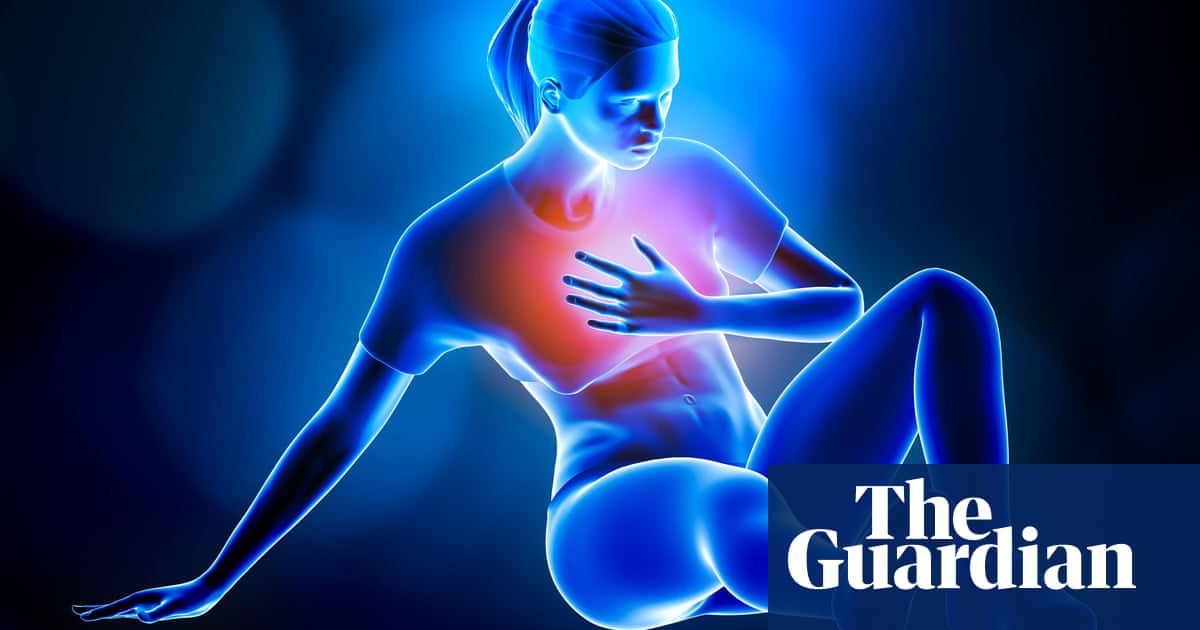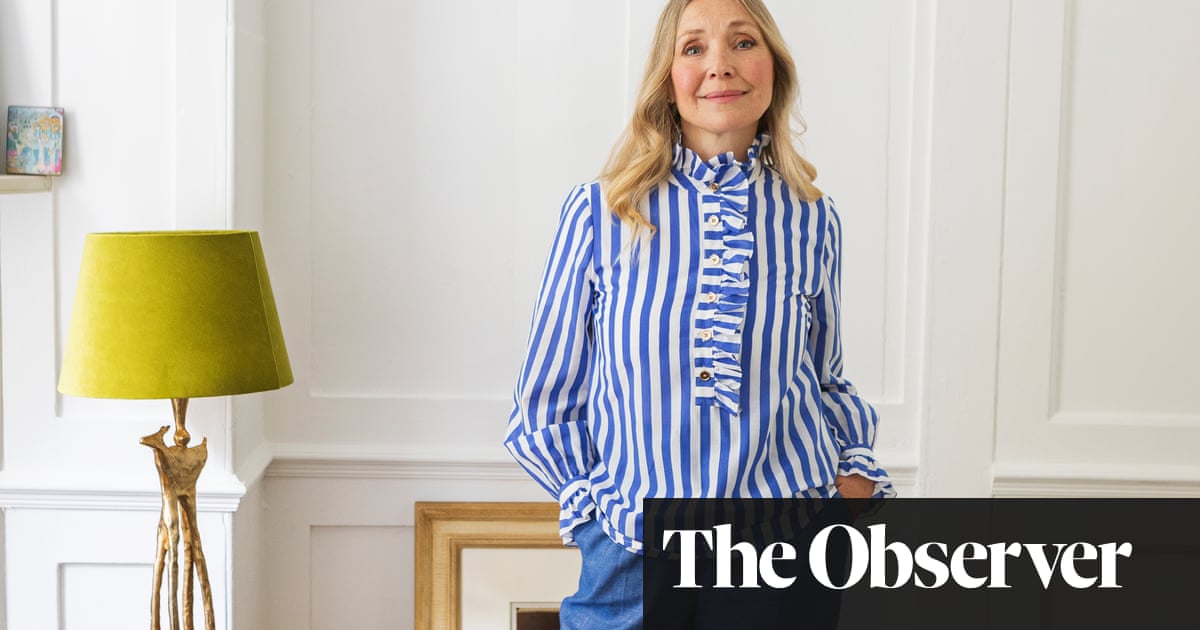
here is a neat little coincidence in the casting of Us, BBC One’s soulful new four-part miniseries. Saskia Reeves and Tom Hollander star as Connie and Douglas Petersen, a middle-aged couple embarking on a “grand tour” of European galleries with their art student son Albie (Doctor Foster’s Tom Taylor), while contemplating the end of their 24-year relationship.
It was also about two and a half decades ago that Reeves, a star of stage and screen since the early 90s, first met her contemporary, Hollander, at the outset of another significant journey. “He drove my removals van when I went to Stratford years ago, because he was very good friends with Hugh Bonneville, who was in the same [RSC] season as I was,” she says. “He doesn’t remember, I don’t think. But that was just Tom; very generous.”
Reflecting on the people we once were and the people we became is very much the subject matter of Us, the first in a string of juicy screen roles that Reeves managed to get in the can before lockdown. The script, adapted by the romcom maestro and author of One Day David Nicholls, from his own 2014 novel, skips back and forth between the present day and the couple’s early courtship. It was a case of opposites attract, with Connie the free-wheeling artist finding security in Douglas, a sensible biochemist, but now Connie is wondering where she took a wrong turn. Regrets? They’ve had a few.
Reeves did meet up with Gina Bramhill, the actor playing Connie’s younger self, but continuity between their performances was not a high priority. “We didn’t get too hung up about that, because, really, they’re almost different people. I mean, they’re not; they’re the same person, but at very different stages in life,” says Reeves. “I suppose it’s a nice way of showing how our lives can change beyond where we thought we would end up.”
As a screen actor, Reeves has several of her own life stages recorded on film and available to reference. It is one of the perks – or perhaps hazards – of a long career. There she is as an incestuous temptress, opposite Clive Owen and Alan Rickman in Stephen Poliakoff’s steamy psychodrama Close My Eyes (1991). Or as a hard-nosed barmaid in the foundational football hooligan text I.D. (1995). More recently, Reeves has become a familiar face in high-end TV thrillers and period dramas, appearing in Luther, Wallander, Page Eight and Wolf Hall. Her frequent stage sojourns have included collaborations with Mike Leigh and Nicholas Hytner. “I do a lot of thinking and digging and wondering now,” she says of her methods. “The more experienced I get, the more it interests me how simple something can be.” As in? “You could simply say: Connie wants to go on holiday and have a good time.”
In the 90s especially, Reeves had a reputation for delivering intense performances based on dedicated research, but this role allowed for a more relaxed approach. Would twentysomething Saskia and twentysomething Connie have got along? “Oh, definitely, yes! We had a lot in common. Y’know, this wild, un-boundaried person who was getting herself into all sorts of scrapes.”
Readers of the book seemed to find Connie less endearing. “I think the general consensus was she wasn’t that likable, because … I don’t know … she was leaving her husband? But I didn’t know that at the time, so I just approached it with an open heart and I found her very likable and very understandable.” Not without some reservations, however. “Personally, I would pull Connie aside and say: ‘Listen, I don’t think this is very fair what you’re doing and, actually, perhaps you should go and get a bit of counselling.’”
It is the sympathetic understanding, though, that most powerfully comes across on screen. Since Nicholls’ novel is narrated from Douglas’s perspective, Connie is inevitably the less fleshed-out of the two characters, but Reeves’ performance allows her to step down off her husband’s pedestal and move more freely. “I think my big thing was [the importance of] her work, her art … there was one speech, I think, that [Nicholls] tweaked because of a conversation we’d had. That was an element of her that I’d padded out in my imagination a bit and he liked that.”
The production’s other great pleasure for Reeves was following the Petersens’ travel itinerary through some of the most cultured cities in the world. “They’re three of my favourite places, actually. My mum is Dutch, so I have a big soft spot for Amsterdam and know it very well. I have relatives there and dear, dear friends in Barcelona and Paris as well.” She had previously spent extended periods in all three cities while performing on stage, but working on Us meant staying in some swish hotels and, on one occasion, having the run of the Louvre for an after-hours shoot.
All in all, it was a treat, but, with Brexit clouds gathering on the horizon, a bittersweet one. Nicholls’ book was published two years before the referendum, but the parallel suggested by the Petersens’ pending split is difficult to avoid. “It just made me realise how ridiculous the whole thing is,” says Reeves with a weary laugh. She applied for her Dutch passport soon after Britain voted to leave the EU. “We may not speak French or Dutch or Italian or whatever, but in fact we are more European than we are American. And to be able to get on a train and go to France, then get on another train and go to Italy or Spain? It’s just brilliant.”
Happily for the Brexit-fatigued, Us is much more focused on the personal than the political, with international travel often the source of its lightest comic touches. “I think that’s what David is so wonderful at,” says Reeves. “And Tom, too: this extraordinary gift to be totally authentic and very funny.” One of Reeves’ favourite lines in the series comes when Albie asks: “Are we gonna do anything spontaneous when we’re on holiday?” to which Douglas drily responds: “I hadn’t planned to,” summing up the planner/freewheeler faultlines in many couples.
Reeves’ approach to holidaying is a happy medium: “My gran always said to me: ‘As a woman, never pack a bag you can’t carry yourself.’ And I really don’t like overpacking.” Since having children, her family camping trips have acted as an opportunity to perfect the kind of meticulous advance-planning that allows travellers true freedom on the road: “There’s a real trick to packing a camper van. I used to think there should be a book about it: Zen and the Art of Camping or something.”
The planned spontaneity principle could also have been applied to her choice of roles. If so, it has resulted in a full and varied slate. There is the post-apocalyptic Shadows by the up-and-coming Italian director Carlo Lavagna, which will feature at various film festivals this year, and David Hare’s political thriller Roadkill, in which she plays the wife of a narcissistic Conservative minister (Hugh Laurie). It is a character that she initially struggled to get a handle on. Then Boris Johnson became prime minister. “The anger sort of suddenly helped me see what David [Hare] was trying to do … she thinks she can hide away in her nice, safe, white, middle-class life and avoid any confrontation or responsibility. Then responsibility comes knocking on her door. It’s very interesting.”
This all seems like the perfect mix of big, glamorous productions and smaller, interesting indies. Is that what Reeves is going for? “Oh, I’ve stopped trying to control all that,” she says. “There’s no such thing as a career, I think.” To which she adds some well-earned actorly wisdom: “‘To career’ means falling uncontrollably from one point to another.” Maybe this is what both the Douglases and the Connies of the world need to accept: yes, the best laid plans often go awry, but isn’t that also a part of the fun?
Us starts at 9pm on BBC One on 20 September












